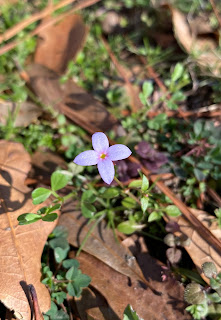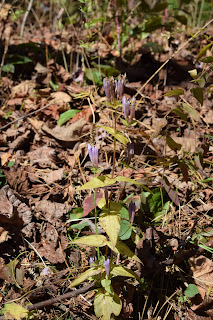I take a lot of pictures throughout the year and not all of them make it into a blog post. At the end of the calendar year, it’s a good time to reflect on the beauty of nature as well as share some of the extra pictures. I believe that each day is an opportunity to find and appreciate something beautiful in the native plants and creatures of Georgia.
Georgia’s winter weather can be mild at times so spotting an early flower like this annual
Houstonia pusilla might be unusual but not impossible. It is, of course, always welcome to get an early flower. Then
February came along with some really cold days such that the tub of water that
I was accidentally keeping had an inch of ice on it! My grandson enjoyed
busting it up.
 |
| Houston pusilla |
 |
| Inch-thick ice in February |
March is a good flower month for us; this is my neighbor’s arbor of Carolina jessamine (Gelsemium sempervirens) looking pretty awesome.
In April, one of our resident pileated woodpeckers enjoyed looking for bugs in
fallen logs on our property.
 |
| Gelsemsium sempervirens |
 |
| Pileated woodpecker |
 |
| Aristolochia tomentosa |
I was thrilled in May
to find that my pipevine (
Aristolochia tomentosa) was blooming for the first time on my fence. The plant has been
there for about 4 years if you’re wondering how long it takes to bloom. The
butterflies laid eggs on it 2 or 3 times and we successfully raised a bunch of
them, a number of which are overwintering in chrysalis.
Speaking of butterflies, this Question Mark butterfly showed up in June and I loved the way
the sunlight made it glow. This one can overwinter as an adult, but I think this
one was probably a fresh one; we have plenty of its host plants in the area:
elm, hackberry, and nettles.
 |
| Question mark butterfly |
 |
| Spring peeper frog |
This tiny frog showed up in July and it is one that I’ve never seen before in my area: a spring
peeper. I’ll add that to my growing list of identified amphibians that I’ve found here. I’ve
found plenty of reptiles too! A young Carolina anole was shedding its skin
in August as it hopped through the dense vegetation of summer looking for tiny
bugs.
 |
| Carolina anole |
This
Jamesianthus alabamensis finally bloomed in September. Its common name is Alabama
warbonnet and I found it at
Plant Life Nursery in Rome. They were growing it
from seed that they’d gotten from a customer. Some of our small nurseries really do grow some unique things. You can search this blog for some of my small nursery profiles.
 |
| Jamesianthus alabamensis |
 |
| Late monarch |
In mid-October I released the last of about 8 monarch butterflies that I raised. A friend nearby had gotten some caterpillars on her
plants and she shared some with me. It was an unusual late summer season in the Atlanta metro area for monarchs, with many folks reporting them later than
usual as they passed through Georgia. This one paused before flight on a Eastern silver aster (Symphyotrichum
concolor).
This Gentianella
quinquefolia is a bit past peak flowering, but it was a new find for me so I get to celebrate finding in November on a hike in North Georgia. I’ll have to
go back earlier next year to see it again.
 |
| Gentianella quinquefolia |
 |
| A mystery Symphyotrichum |
I end the year with a mystery which has me looking forward to 2022. This pretty aster was still blooming in mid-December in north
Fulton County. I posted photos of it to the Southeastern Flora group on
Facebook. Based on feedback there
and my own
research, it might be Curtis’s aster (
Symphyotrichum retroflexum). I’m going to try and collect seeds and see if we can better
figure this out.
Wishing you a good year in 2022 and more native plants and critters in your daily life.






















